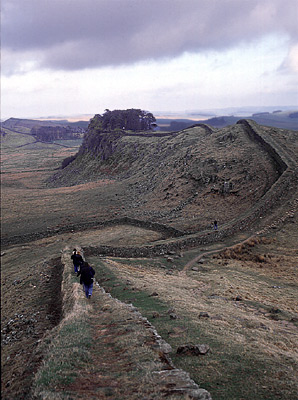When Iraqi peacekeepers stood guard at Hadrian's Wall
Charlotte Higgins, arts correspondent
Saturday July 15, 2006
The Guardian

Hadrian's Wall in Northern England strechtes from near the west coast to near the east coast. It was built by the Romans to keep the Scots out from their Empire. The Romans saw only the Roman Empire as the civilised world - therefore what is now England and Wales was a part of the civilised world, but what is now Scotland wasn't. Nowadays, the wall doesn't mark the border between England and Scotland. It is wholly in England. The border is a bit further north.
------------------------------------------------------------------------------
While British soldiers battle it out in Iraq, spare a thought for this: troops from Iraq once occupied Britain.
A unit of Iraqis, probably from the Basra region, formed part of the Roman troops defending the empire from incursions at its northernmost border, Hadrian's Wall.
A Roman document from about AD400 called the Notitia Dignitatum - a list of all the military and civil posts of the empire - refers to an irregular unit of "bargemen from the Tigris", based at Arbeia, the fort nearest modern South Shields.

Emperor Hadrian built Hadrian's Wall. It was patrolled by Roman soldiers to keep out the Scots.
Thorsten Opper, a curator in the Greek and Roman department at the British Museum, clearly relishes the piquancy of this example of history's circularity. "Call it an exchange of peacekeepers," he said.
The "bargemen from the Tigris" had probably been a marine force patrolling the mouth of the Tyne, Mr Opper said. Arbeia was a supply base for the 17 forts along Hadrian's Wall, with supplies transported to the fort by boat.
Mr Opper thinks it probable that the bargemen came from the southern portion of the Tigris towards the Gulf - perhaps from modern Basra.
"The Tigris delta is where the marshes were: that the bargemen came from there is the likelihood." The name Arbeia itself could be derived from the Latin for Arab, he added. "It is not certain, but it is considered a likelihood."
One of the most significant archeaological finds at Arbeia is a tombstone of a British woman married to one Barates - who came from Palmyra, in Syria. There were also Numidians (from modern Algeria) at Carlisle in the late second and early third centuries, and a crack team of Batavian (modern Dutch) horsemen at the frontier - all part of numerous auxiliaries of the Roman army posted far from home.
Though the Notitia Dignitatum dates from AD400, well after the building of Hadrian's Wall from AD122, it is possible Iraqis had been based at Arbeia earlier in the fort's history, according to Mr Opper. The empire under Hadrian and his predecessor, Trajan, stretched as far as the Gulf.
Mr Opper is to curate an exhibition about Hadrian for the British Museum in 2008. He believes that there are pungent historical resonances between then and now. Hadrian, for instance, inherited an empire that was overextended and plagued by incursions and guerrilla warfare on its fringes. His response? To withdraw troops from hotspots.
"It was a successful policy," Mr Opper said. "It is interesting we are experiencing a very similar situation now - and dealing with it in a very different way."
guardian.co.uk
You're a real asshole, ya know that?
You're a real asshole, ya know that?
???????????????????
Arty's mom is Scotish......and if you knew her GB you would recant that little post cause Arty's mom is hot. Aye, she's a fine wee lassie. ![]()